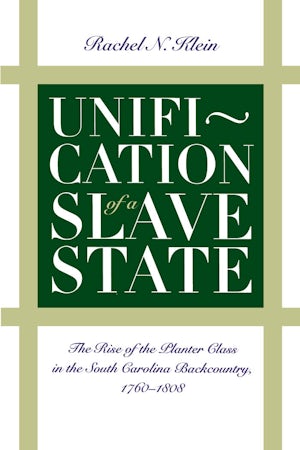Unification of a Slave State
The Rise of the Planter Class in the South Carolina Backcountry, 1760-1808
By Rachel N. Klein
344 pp., 6.125 x 9.25, 5 maps, 15 tables
-
Paperback ISBN: 978-0-8078-4369-7
Published: April 1992 -
E-book PDF ISBN: 979-8-8908-8669-9
Published: December 2012 -
E-book EPUB ISBN: 978-0-8078-3943-0
Published: December 2012
Published by the Omohundro Institute of Early American History and Culture and the University of North Carolina Press
Buy this Book
- Paperback $47.50
- E-Book $29.99
Published by the Omohundro Institute of Early American History and Culture and the University of North Carolina Press
Awards & distinctions
1990 Willie Lee Rose Prize, Southern Association for Women Historians
1990 Francis Butler Simkins Award, Southern Historical Association
The spread of cotton into the backcountry, often invoked as the reason for South Carolina's political unification, actually concluded a complex struggle for power and legitimacy. Beginning with the Regulator Uprising of the 1760s, Klein demonstrates how backcountry leaders both gained authority among yeoman constituents and assumed a powerful role within state government. By defining slavery as the natural extension of familial inequality, backcountry ministers strengthened the planter class. At the same time, evangelical religion, like the backcountry's dominant political language, expressed yet contained the persisting tensions between planters and yeomen.
Klein weaves social, political, and religious history into a formidable account of planter class formation and southern frontier development.
About the Author
Rachel N. Klein is associate professor of history at the University of California, San Diego.
For more information about Rachel N. Klein, visit
the
Author
Page.
Reviews
"To the extent that developments in South Carolina presaged what was to come in other southern states, Unification of a Slave State constitutes an important contribution to the historiography of the region in general as well as the state in particular. Klein's stimulating and sophisticated book is therefore a must-read for anyone interested in the history of the region."--Robert Weir, University of South Carolina
"In her important Unification of a Slave State, Rachel N. Klein expertly wields a historian's prime weapon: exploring when things happen. . . . She clarifies why the spread of cotton culture brought unity so seemingly instantly to South Carolina."--William Freehling, The Johns Hopkins University
"Klein offers a telling and readable account of the transformation of South Carolina that will intrigue scholars and lay readers alike."--South Carolina Historical Magazine
"[Klein] presents compelling accounts of a series of struggles that shaped the backcountry's social and political order."--Journal of American History




